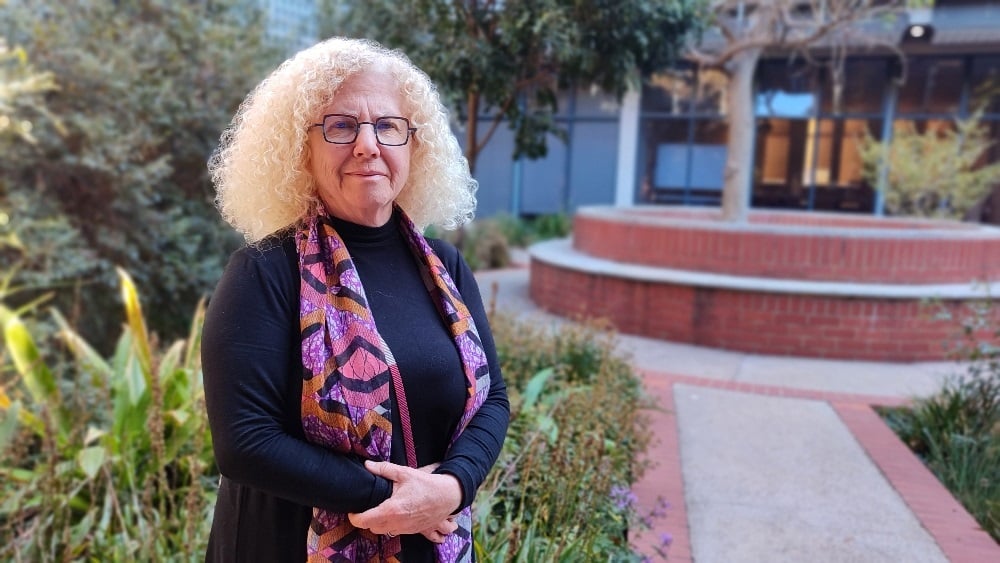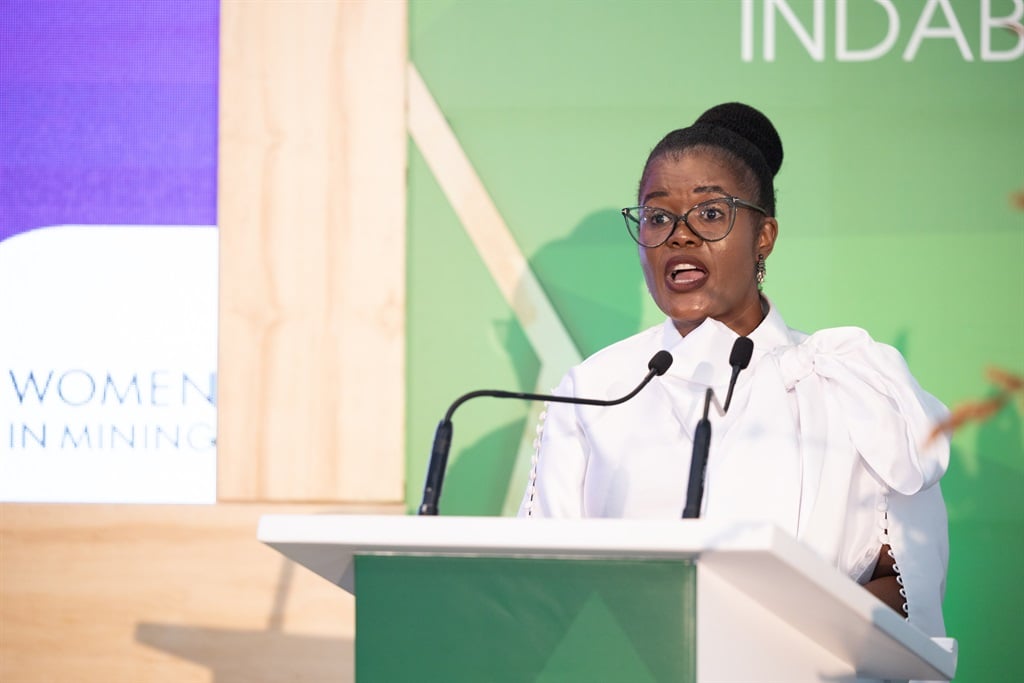Subscribers can listen to this article

Health scientist Kathy Kahn is a professor at the University of Witwatersrand. (Ufrieda Ho/Spotlight)
- Working with rural women sparked the flame for Professor Kathy Kahn to dedicate her research to such communities.
- She helped set up the founding health surveillance site of the SA Population Research Infrastructure Network.
- One of the early interventions Kahn introduced to bolster health data collection was the use of verbal autopsies.
There's a point in the road out of Gauteng towards Bushbuckridge - past the dark of the JG Strijdom tunnel, beyond where the hem of the Highveld gives way to the Lowveld - that starts to feel like homecoming for Kathy Kahn.
Kahn is a Joburger and a professor in the School of Public Health at the University of the Witwatersrand (Wits). For more than three decades, she's split her city life with doing research in rural communities in Mpumalanga.
It was in the 1980s, as a second-year medical student, that Kahn first visited the area.
"On some of those trips, I did voluntary vacation work, including with a Swiss missionary who worked with village women in the Giyani area - it was a life-changing experience. This was the height of apartheid. And seeing the extent of poverty and rural neglect, I knew then that these were the communities I wanted to work in," she tells Spotlight.
At the time, there were no postgraduate courses in public health offered in South Africa. It led Kahn to finish her medical degree and to head to Harvard in the US.
Years later, in 1998, Wits launched its Masters of Public Health programme, with Kahn as its first academic coordinator.
Kahn's work also earned her Harvard's prestigious Alumni Award of Merit in 2020.
'We didn't know where to start'
In the years before that, though, working in the Bushbuckridge community meant starting with many unknowns. Good population health data simply didn't exist.
She said: "We didn't know where to start; we had so many questions, like how many people lived in one particular area? What services were they getting, what were they needing? How many children were there? How many women of reproductive age were there? That's when we decided to set up a health and demographic surveillance system within the research unit; it was 1992."
The "we" is Kahn and her professional and life partner, Professor Steve Tollman. They fell in love as medical students and shared a passion for improving rural healthcare services.
Today, the unit they set up goes by Agincourt, or its full name - the South African Medical Research Council/Wits Rural Public Health and Health Transitions Unit.
Agincourt is the founding health surveillance site of a group of seven, which makes up the South African Population Research Infrastructure Network.
Verbal autopsies
One of the early interventions Kahn introduced to bolster health data collection was the use of verbal autopsies.
Today, the Agincourt unit is a collaborating centre, along with the World Health Organisation, on standards for verbal autopsies.
With verbal autopsies, a standardised questionnaire is used to interview family members or caregivers to determine medical history, symptoms prior to death and cause of death. This is especially critical, given that many people in rural settings die at home, and are not attended to by a trained medical officer. This includes half of all child deaths in the country, according to Kahn.
"The assignment of cause of death is not very good in South Africa. There's a lot of misclassification still with HIV-related deaths and deaths from accidents, injuries, homicides and suicides," she adds. (See Spotlight's recent in-depth reporting on tuberculosis autopsy research in South Africa).
READ MORE | Probing mysteries of the dead: Top forensic pathologist looks back as Cape Town gets new mortuary
"Without proper data, you don't know why people are dying and you don't know what people are dying of. If you don't know what people are dying of, you don't know what the burden of disease is. You also don't know what the priority problems are, so you don't know where to target your resources," she said.
Their emphasis on data collection from the very start has meant they have been able to better understand the contexts of problems in the health system.
Maternal mortality, for instance, says Kahn, could be less about the availability or quality of obstetric services and more about access to reliable transport to get to a clinic.
There have been important findings.
She said: "In the mid-1990s, we learned that women just starting middle age - so not very old - were dying of stroke and other cardiovascular diseases. At the time, rural black African women dying of what were then regarded as Western, urban conditions was absolutely a revelation."
'Focus on better outcomes'
Kahn's current work looks at mental health, HIV prevention and obesity and weight problems in adolescent girls. She says the research must always be undergirded by focusing on better outcomes for the people in the community.
For instance, in looking at HIV prevention strategies among teenage girls, Kahn's team trialled a one-off, long-term conditional cash transfer programme.
The thinking of the programme was to explore whether giving teenage girls financial support could help them stay in school longer and, thereby, help them make better decisions about their relationships and who they have sex with.
The project spanned several years, following the girls through to the end of their school careers.
ALSO READ | 'Respected' Eastern Cape health administrator returns to her HOD post
Kahn said the intervention didn't show a significant difference in HIV incidence, but did show positive impacts in helping girls in the project stay in school longer.
The teens also made less-risky decisions around sexual choices. There was also a positive impact in reducing gender-based violence. Kahn is currently working on grant applications for follow-up research.
"During the course of that work, we looked at various risk factors and outcomes. We also looked at measures of mental health and depression. Even though it had been shown elsewhere that being HIV positive could lead to depression, for the first time we could draw a link between depression leading to HIV acquisition," she said.
A Bushbuckridge anchor
Kahn argued that, when pulling together the multiple strands of systemic problems in these rural communities, one cannot afford to shy away from the complexities of people's everyday lives.
She cautioned that researchers should never assume they have an insider's perspective, even after years of working in a community.
She added:
These are our host communities, we have been privileged to be allowed in. We are not part of the community, but it's also our job to try to respond to the community's needs.
For her, Agincourt's research must be grounded in clear, consistent communication and feedback to the community. It's also that Agincourt should be a Bushbuckridge anchor, not an extractive research unit out for quick profit off people's data, she said.
Valuable data
That said, after 30 years of consistent collection and analysis, the data they've collected is uniquely valuable.
Described as a "high-resolution longitudinal resource", it provides a detailed picture of what has happened to people and communities over an extended period of time.
Over the years, other researchers from across disciplines have relied on the Agincourt research and data resources to advance their own studies in understanding shifting rural health dynamics.
And those dynamics are varied – including things like how the arrival of mall culture in rural areas is affecting food systems, how informal political power is affecting water access in villages, the changing role of traditional healers, and how urban migration is recalibrating healthcare choices in rural villages.
She said:
I am proud of the science that we have done. Proud, too, that we have been able to bring scientists from South Africa and across the world to work, to answer big science and public health questions and that their thread of connection to Agincourt remains.
"Those who come here learn not just how to do research, but they learn about respect for community. They learn about the importance of engaging with the public sector and other key stakeholders. They learn about research translation and how to move findings into policy," she said.
Ultimately, for Kahn, it's been about improving lives - not just through science, but through creating opportunities.
She said: "Maybe what I am most proud of is the role that Agincourt has played in bringing employment and new prospects to the communities. Throughout the Aids pandemic and throughout Covid-19, we were able to sustain the employment of the people who work at the centre or are associated with the centre. There have also been community-based entrepreneurs who got their start as spin-offs from the scientific enterprise. I guess this has been about bringing some hope."
Fortitude and compassion
Kahn may call herself an outsider; "a privileged research guest" in the community, but it's the community she said she's "bonded to".
"I have learnt so much professionally from these communities over the past three decades. I have also grown my depth of understanding about resilience, about fortitude, and also about compassion from how people in these communities navigate their lives," she said.
ALSO READ | Women in medicine share their health tips this Women's Month
Kahn still makes the trip back to Joburg every few weeks. In the city, she can escape to her favourite time-out of popcorn and movies on the big screen.
She can catch up on campus life and things of the big smoke. But the itch to be back on the road comes soon enough. It's to be back in the Lowveld, back to the research, and back to "her people" - exactly as she's done for more than 30 years now.
*This article is part of Spotlight's 2024 Women in Health series, featuring the remarkable contributions of women to medicine and science. Sign up to the Spotlight newsletter.
We live in a world where facts and fiction get blurred
Who we choose to trust can have a profound impact on our lives. Join thousands of devoted South Africans who look to News24 to bring them news they can trust every day. As we celebrate 25 years, become a News24 subscriber as we strive to keep you informed, inspired and empowered.
Next on News24
Magashule ex-PA extradition saga: Legal team confident of securing bail despite State's opposition
22m ago




 1 month ago
51
1 month ago
51


















